-
Global dialogue on care
Friday 5 February 2021

Co-chaired by Professor Brian Lawlor and Paul Hogan, this global dialogue covered progress made in the field of care and the challenges that remain, exploring models of care, the burden of caregivers, and art and music in dementia. Professor Felicity Barker, Professor Louise Robinson, Professor Mary Sano and Dr Samir Sinha presented their thinking ahead of an open discussion.
-
Global dialogue on prevention
Tuesday 9 February 2021

Co-chaired by Professor Kaarin Anstey and Professor Philippe Amouyel, this global dialogue examined the evidence base for dementia prevention programmes and some of the current research happening in the field, prevention programmes and their practical implementation, as well as some of the lessons from other public health initiatives. Professor Carol Brayne, Dr Michele Cecchini and Dr Yoshiki Niimi presented their thinking ahead of an open discussion.
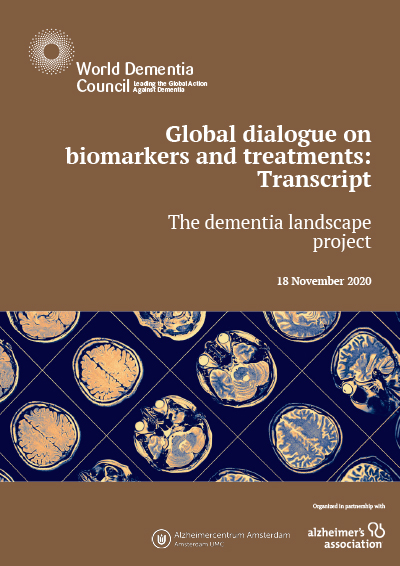
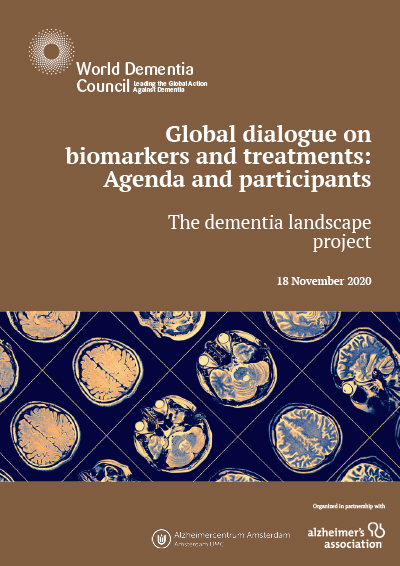
The world’s first G8 dementia summit was held in 2013 in London, where the international community of top scientists in the field, research funders, pharmaceutical companies and governments committed to accelerate the research agenda and deliver the first disease-modifying treatment by 2025. Since then the field has made considerable advances and there has been a significant increase in funding in the field of dementia research. This has been instrumental in fostering global collaborations and driving cutting-edge technological developments, including the use of big data, to understand the biology of dementia and develop potential therapeutics and treatments.
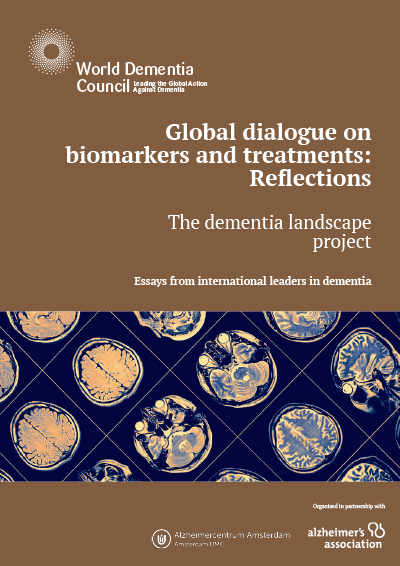
Chaired by Dr Maria Carrillo and Professor Philip Scheltens, this global dialogue was held on 18 November 2020 and covered two themes that we selected based on their importance in the field. Firstly, early detection and biomarkers. This is an exciting area of progress and also a key one. According to the World Health Organization, around 50 million people have dementia worldwide and this number is projected to reach 152 million in 2050. In 2015, the global societal cost of dementia was estimated to be $818 billion, and this is projected to rise up to $2 trillion by 2030. Therefore, it is critical to be able to accurately detect Alzheimer’s and all other dementia, and develop and deliver effective treatments by identifying individuals who might most benefit from it. Secondly, the dialogue discussed advances in treatment: what the state of play is and what the challenges are.
Professor Oskar Hansson and Professor Reisa Sperling gave an overview on the first theme, with Dr Catherine Mummery and Dr Eric Siemers following on the second. Each shaped their contribution around where we have come from, where the field is now, and what the next steps are.
In the documents above, you can read about the participants, a transcript of the discussion, its well a a series of essays offering reflections on the conversations had during and after the dialogue.

Co-chairs
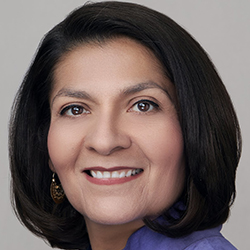 Dr Maria Carrillo
Dr Maria Carrillo
Maria Carrillo is chief scientific officer at the Alzheimer’s Association (US), setting the strategic vision for the Association’s global research program. Dr Carrillo has published extensively on early diagnosis and biomarker standardization efforts, as well as on the global challenges to progress for research in Alzheimer’s and dementia. She is a co-author of the “Appropriate Use Criteria for Amyloid Imaging,” published by the Society of Nuclear Medicine and Molecular Imaging and the Alzheimer’s Association. Dr Carrillo earned her PhD from Northwestern University’s Institute for Neuroscience and completed a postdoctoral fellowship focused on Alzheimer’s brain imaging and risk factors at Rush University Medical Center in Chicago.
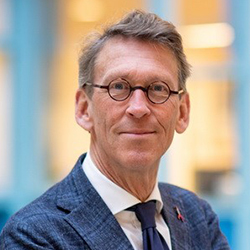 Professor Philip Scheltens
Professor Philip Scheltens
Philip Scheltens is professor of cognitive neurology and director of the Alzheimer Center, Amsterdam University Medical Centers (The Netherlands) and member of the World Dementia Council. His main clinical and research interests are Alzheimer's disease, vascular dementia, frontotemporal dementia, magnetic resonance imaging, PET imaging and fluid biomarkers. He is active in the field of biomarkers and clinical trials and has been the national PI for many studies, including phase 1-3 multicenter clinical trials. He founded and directs the Alzheimer Center since 2000, from which over 70 PhD theses have appeared since. In 2013, he co-founded the Dutch national plan against dementia (Deltaplan Dementie) and serves as the chair of its board.

Presenters
 Professor Oskar Hansson
Professor Oskar Hansson
Oskar Hansson is a neurology professor at Lund University and serves as a consulting neurologist at Skåne University Hospital (Sweden). During the last 20 years, Professor Hansson has conducted clinical and translational research focusing on the earliest phases of Alzheimer's. He has built a creative and multi-disciplinary research team and leads the Swedish BioFINDER study. His research combines the study of well characterized patient cohorts with state-of-the-art biomedical and biophysical techniques, most notably in brain imaging. Professor Hansson earned his doctorate in neurobiology, a medical degree, and additional training as a neurology specialist at Lund University.
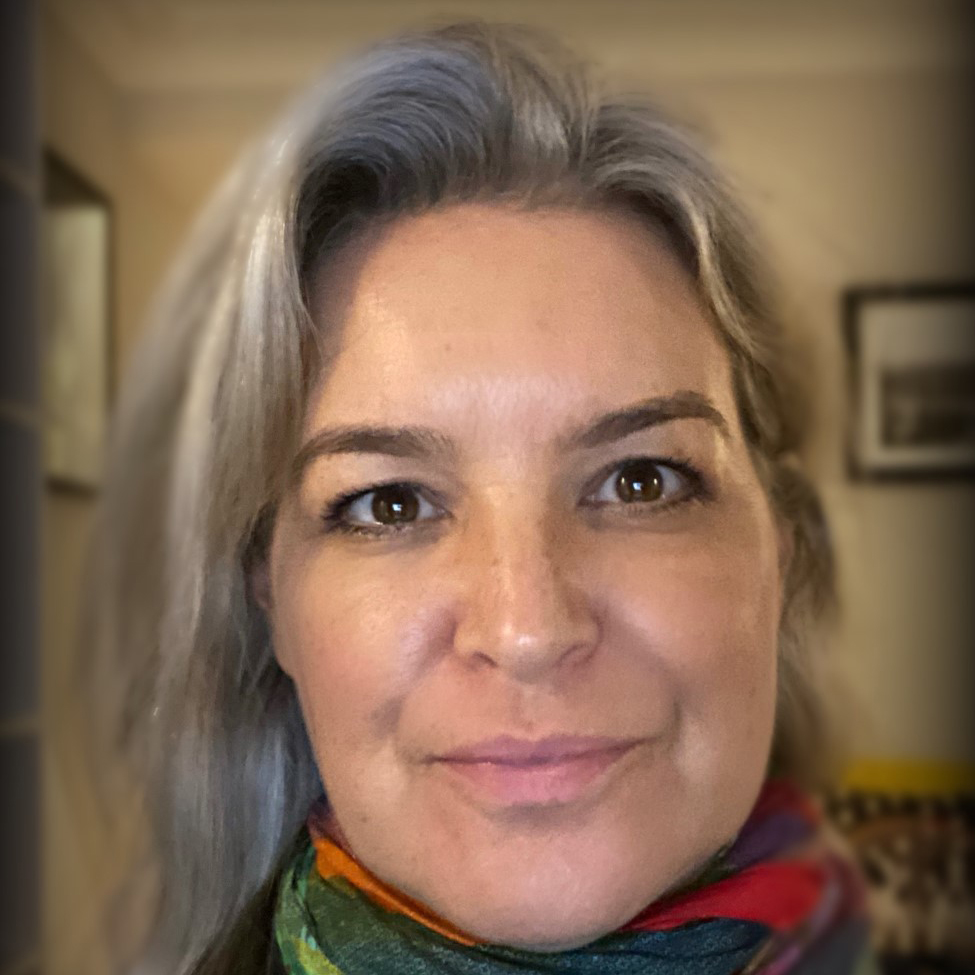 Dr Cath Mummery
Dr Cath Mummery
Cath Mummery is a consultant neurologist, and leads the Cognitive Disorders Service at the National Hospital for Neurology and Neurosurgery. She is head of clinical trials at the Dementia Research Centre, University College London and has been chief investigator on
over 20 early phase drug trials of potential disease modifying agents, including the ground-breaking platform trial DIAN-TU in presymptomatic individuals at risk of familial AD, and a first-in-human antisense oligonucleotide study, targeting MAPT to reduce tau in AD. She has a particular interest in early phase studies and genetic therapies, and in the psychological impact of trial participation. She sits on a number of advisory boards for potential disease modifying agents and for dementia service development. She is deputy director for the Leonard Wolfson Experimental Neurology Centre at NHNN, a unit dedicated to the conduct of early phase trials in neurodegeneration.
 Dr Eric Siemers
Dr Eric Siemers
Eric Siemers has over 25 years of experience in clinical trials of neurodegenerative disease. His research focus is on the use of biomarkers in investigational drug research, the development of trial designs that fully characterize the effects of investigational drugs on chronic diseases, and more specifically, the development of strategies for treating individuals before the onset of symptoms of neurodegenerative diseases. Dr Siemers most recently served as a distinguished medical fellow for Eli Lilly and Company’s Alzheimer’s Disease Global Development Team, where he was responsible for the design and implementation of five large Phase III clinical studies, in addition to playing a major collaborative role in 2 public-private partnership studies. Dr Siemers earned his medical degree from the Indiana University School of Medicine (US).
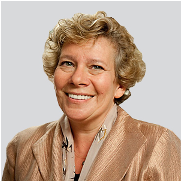 Professor Reisa Sperling
Professor Reisa Sperling
Reisa Sperling is co-principal investigator of the Harvard Aging Brain Study in Boston (US). She is a neurologist focused on the detection and treatment of Alzheimer’s disease, even before clinical symptoms are evident. Her research uses neuroimaging and cognitive tests to understand the aging brain and the earliest changes associated with Alzheimer’s disease. She is a professor in neurology at Harvard Medical School, director of the Center for Alzheimer Research and Treatment at Brigham and Women’s Hospital, and director of neuroimaging for the Massachusetts ADRC at Massachusetts General Hospital.

Other dialogues in the series
To inform the dementia landscape report, the Council has hosted global dialogues for international dementia leaders focusing on key themes of research, care and prevention that were identified at the London dementia summit in 2013, as well as on additional key themes and new policy priorities that we have agreed to highlight in the report, including data sharing and dementia registries, technology and dementia, and the impact of dementia on low- and middle-income countries. See more below.